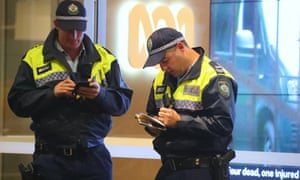Greens and Centre Alliance say the government is guilty of double
standards and action only gets taken over leaks ‘embarrassing’ to
officials
The Greens and Centre Alliance have accused the government of a double standard over two police raids on media outlets investigating embarrassing leaks.
The Greens senator Nick McKim accused the government of “leaking sensitive information like a sieve when it suits them” while Centre Alliance’s Rex Patrick said it was “abhorrent” that public interest reports applying scrutiny to officials’ actions are now being investigated.
The comments were prompted by two raids in two days: targeting Annika Smethurst of News Corp Australia on Tuesday over a leaked plan for greater powers to spy on Australians; and the ABC on Wednesday for an investigation about alleged unlawful killings in Afghanistan by Australian special forces.
Australia’s laws criminalise unauthorised disclosures by public servants and provisions that prohibit publication of proscribed information also apply to journalists – even before new offences were added in espionage laws that passed in 2018.
Over the last three years referrals to the police resulted in raids investigating leaks about the national broadband network and Peter Dutton’s ministerial intervention in the case of two foreign au pairs.The Greens senator Nick McKim accused the government of “leaking sensitive information like a sieve when it suits them” while Centre Alliance’s Rex Patrick said it was “abhorrent” that public interest reports applying scrutiny to officials’ actions are now being investigated.
The comments were prompted by two raids in two days: targeting Annika Smethurst of News Corp Australia on Tuesday over a leaked plan for greater powers to spy on Australians; and the ABC on Wednesday for an investigation about alleged unlawful killings in Afghanistan by Australian special forces.
Australia’s laws criminalise unauthorised disclosures by public servants and provisions that prohibit publication of proscribed information also apply to journalists – even before new offences were added in espionage laws that passed in 2018.
A report in the Australian quoting home affairs department advice about the medevac legislation was referred to the police and earned an extraordinary rebuke from Australia’s top spy chief for misrepresenting the advice as from Asio.
Police investigated a leak from the then employment minister Michaelia Cash’s office tipping media off about an imminent raid on the Australian Workers Union, resulting in a brief to prosecutors who then declined to prosecute.
“These raids were made possible by the steady flow of laws which have consolidated power, eroded privacy and removed rights, all supported by the LNP and ALP,” he said.
“This government leaks sensitive information like a sieve when it suits them, yet disgracefully pursues journalists and media outlets which embarrass them.
“Australia needs stronger whistleblower protections, a charter of rights and better protections for journalists and citizens from government overreach.”
Patrick said the public had a “right to know” about discussions between the heads of the defence and home affairs ministries discussing extending spying powers to Australian citizens.
He said Smethurst’s report was “simply embarrassing” to the agencies rather than supplying information that could harm national security. Allegations against Australian troops were similarly “matters that there should be public scrutiny of”.
“Both relate to national security, but they were both issues that dealt with uncomfortable conversations – the conduct of officials – that’s the bit I find abhorrent in this instance.”
Patrick agreed there was a double standard about how vigorously certain leaks were pursued, citing the example of the police refusing to investigate a leak to journalist Niki Savva about the decision to prosecute former Asis spy Witness X and his lawyer for disclosing that Australia spied on East Timor.
Savva told the ABC’s Insiders that the commonwealth director of public prosecutions made a “strong recommendation” to prosecute Witness K, suggesting that the attorney general, Christian Porter, did not have “any choice but to proceed” by giving approval.
On 2 July 2018 the independent MP Andrew Wilkie wrote to the AFP seeking an investigation into the “improper disclosure to a journalist of protected information”.
Superintendent Mark Colbran wrote back on 18 July 2018 declining to investigate on the basis that there was “insufficient information to determine whether a commonwealth offence has been committed”.
Colbran explained that an operations committee makes an assessment based on “the nature of the alleged crime, the gravity of the matter, the sensitivity of the matter, the effect of the alleged criminality”, among other factors.
Lawyer Bernard Collaery, who represents Witness X and is also being prosecuted, said the law “must be applied equally”, citing the “numerous leaks” that have not been investigated.
Collaery noted that before she became foreign minister the then shadow minister Julie Bishop disclosed in 2010 that Australia forges passports, which he described as a “huge breach of security”.
Emily Howie, the Human Rights Law Centre legal director, said the raids were “clearly a show of force” which sent a “really worrying” message to whistleblowers and journalists working on national security stories.
“We’re really concerned with the chilling effect this has on others coming forward.
“I think there’s been a clear and worrying trend of governments trying to silence whistleblowers and journalists who want to reveal information in the public interest.”

No comments:
Post a Comment